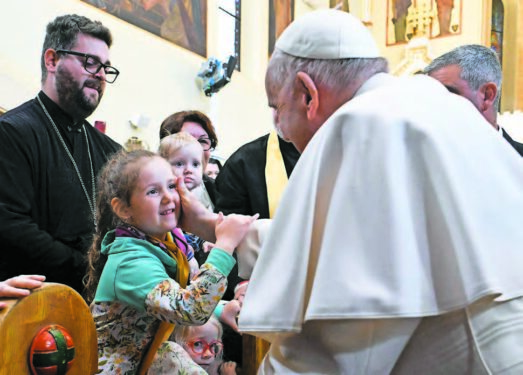
By Elise Ann Allen, Special to The Tablet
In the lead-up to Pope Francis’ weekend trip to Hungary, expectations were high for how he would engage the issue of the war raging in neighboring Ukraine, with many locals hoping for some strong language from the pontiff.
His April 28-30 trip to the Hungarian capital of Budapest marked the first time Pope Francis has traveled to Central Europe since the outbreak of the Ukraine war following Russia’s invasion in February of last year.
Many observers saw the choice of Hungary as a strategic move on the part of the pontiff, as it shares some 85 miles of border with Ukraine and has welcomed and assisted over a million Ukrainian refugees fleeing the war, yet is politically and economically friendly toward Moscow.
Hungarian Prime Minister Viktor Orbán is a longtime ally of Russian President Vladimir Putin and, while still voting in favor of them, has vocally criticized EU sanctions against Moscow. Unlike most of its Western allies, Hungary has so far refused to provide military assistance to Ukraine or allow the transfer of weapons across borders.
While Pope Francis and Orbán have traditionally butted heads over issues such as migration, both men have stressed care for Ukrainian refugees, and even Pope Francis, a vocal opponent of the global arms trade, has questioned the wisdom of arming Ukraine.
Many Catholics in Hungary awaited the pope’s arrival on April 28, expecting him to offer a firm message on Ukraine and a vocal appeal for peace. However, while issuing a pointed message on welcoming and acceptance of foreigners in the anti-migrant nation, Pope Francis was cautious when it came to Ukraine, making only passing and subtle references to the war throughout his visit.
His opening speech to Hungarian authorities was a natural moment to engage the issue of the Ukraine war. However, he only made one mention of the conflict, outlining his vision for the future of Europe as a unified entity capable of responding effectively to modern threats, including the Ukraine war.
Pope Francis dodged the issue almost entirely in his meeting with bishops, clergy, and men and women religious later that day, choosing instead to use the occasion to drive home the need to avoid ideological divisions and work “as a team” to strengthen the Church amid growing European secularism.
On April 29, his second day in Hungary, the pope engaged the Ukraine issue more directly, though with subtle means.
After visiting an institute that assists disabled children, Pope Francis held a meeting with poor people and refugees, including several who had fled the war in Ukraine and are now living in limbo abroad. One of the testimonies he heard that morning was from a man who fled with his wife and five children when their home city was bombed and who is now living in Hungary and is back on his feet after receiving a stipend from Caritas.
Once he returned to the apostolic nunciature in the afternoon, Pope Francis held a previously unannounced meeting with Russian Orthodox Metropolitan Hilarion of Budapest and Hungary, who served as the Moscow Patriarchate’s foreign minister, meaning its second-highest-ranking official. His ouster from the position last year was interpreted by many as a sign of diverging opinions on Russia’s invasion of Ukraine.
The Vatican offered few details on the 20-minute conversation. However, during his return flight from Budapest to Rome on April 30, the pope told journalists during his inflight press conference that “in these meetings, we did not just talk about Little Red Riding Hood. We spoke of all these things. Everyone is interested in the road to peace.”
The pope’s most direct remarks about the war came at the end of his public Mass on April 30, when in comments before praying the “Regina Coeli,” he alluded to Hungary’s border with Ukraine, saying borders should be points of contact, not division.
Pope Francis was more upfront about the conflict during his inflight press conference on his way back to Rome when he received a question about his meeting with Metropolitan Hilarion and whether he was seeking contact with Moscow through the prelate and through Orbán.
Referring to his meeting with Metropolitan Hilarion, the pope told journalists that “peace is always made by opening channels. You can never achieve peace through closure.”
The pope said he is also in contact with Metropolitan Anthony of Volokolamsk, who took Hilarion’s position as the Moscow Patriarchate’s foreign minister last year. “Through him, I am in touch with Kirill,” he said, referring to the Russian Orthodox Patriarch.
Pope Francis said a meeting with Patriarch Kirill is still being planned and said that “right now a mission is underway” in the service of peace. He also indicated a willingness to help in the return of Ukrainian children deported to Russia, saying, “We must do everything humanly possible.”
His reference to a peace mission indicates that whatever he might or might not say in public, there is still movement in the background, and perhaps a bit of restraint on his part in the public eye can do more in service of what is happening behind closed doors.
